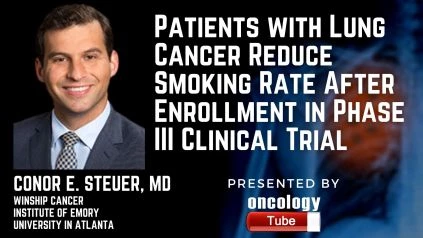Conor E. Steuer, MD from the Winship Cancer Institute of Emory University in Atlanta discusses Patients with Lung Cancer Reduce Smoking Rate After Enrollment in Phase III Clinical Trial.
Link To Article –
https://www.eurekalert.org/pub_releases/2021-02/iaft-pwl013021.php
(DENVER—February 1, 2021, 10:00 a.m. EST) According to research published today in the Journal of Thoracic Oncology, the first systematic, prospective study of smoking habits in patients with non-small cell lung cancer (NSCLC) who were involved in a phase III early-stage trial showed that there was a high rate of smoking reduction and cessation following entry into the study. The JTO is the International Association for the Study of Lung Cancer’s official publication.
According to the Surgeon General’s 2014 study, persistent smoking following a diagnosis of lung cancer is associated with an estimated 50 percent median rise in mortality.
Dr. Conor Steuer of Emory University’s Winship Cancer Institute in Atlanta and colleagues conducted prospective evaluations assessing the trends of tobacco use and abstinence and the impact on results. The research was performed as part of the ECOG-ACRIN 1505 trial, which aimed to evaluate whether the addition of bevacizumab to adjuvant chemotherapy in patients with early-stage resected NSCLC would improve overall survival (OS). The initial trial procedure analyzed the trends of tobacco use and the effects as secondary endpoints on overall performance.
The study surveyed 1,501 baseline patients with NSCLC who were enrolled in the EA 1505 trial for three, six, nine, and twelve months. Of those surveyed, 90 percent reported a current or prior history of cigarette smoking, but only 11 percent reported being current smokers at the time of study enrollment. For patients who recorded smoking at the time of their diagnosis of lung cancer but were no longer enrolled at the time of the study, 1% reported smoking at 12 months of age. Overall, at 12 months, 94 percent of respondents smoked no or less cigarettes a day.
Steuer recorded that DFS was not substantially different for never-smokers compared to current and former smokers (HR 0.93, p=0.64, HR 1.05, p=0.72), but overall survival was increased for never-smokers (adjusted HR for death 0.54, p=0.005, adjusted HR for death 0.68, p=0.03).

